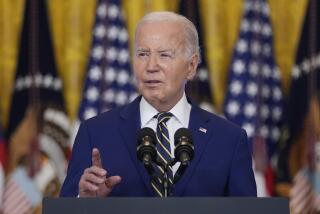Appeals Court Backs Military Policy, Upholds Discharge of Two Gay Men
A sharply divided federal appeals court in San Francisco on Friday upheld the military’s “don’t ask, don’t tell” policy, marking another setback for advocates of gay rights in the nation’s armed services.
In a 2-1 decision, the U.S. 9th Circuit Court of Appeals ruled that there is a rational basis for the 1993 policy, which permits homosexuals to serve in the military as long as they do not announce their sexual orientation. The court validated decisions by the Navy and the California Army National Guard to expel two decorated servicemen who in 1995 voluntarily acknowledged that they were gay, even though there was no evidence that they had engaged in homosexual conduct.
In earlier rulings in the cases, which were consolidated on appeal, a federal trial judge in Seattle had upheld the policy, while a federal trial judge in San Francisco had ruled against it.
Friday’s ruling marked the fourth time in the past year that a federal appeals court has upheld the policy.
The federal policy calls for the discharge of any service member who “engages in, attempts to engage in, has a propensity to engage in, or intends to engage in homosexual acts.” A “homosexual act” is defined as “any bodily contact, actively undertaken or passively permitted, between members of the same sex for the purpose of satisfying sexual desires.” Moreover, the policy expressly provides for the discharge of any person who states that he or she is a homosexual unless the person rebuts the presumption that he or she will probably engage in homosexual conduct.
Before 1993, there had been a ban on gays and lesbians serving in the U.S. armed forces. As a presidential candidate, Bill Clinton said he supported the repeal of the ban. But shortly after his election, the Pentagon and some members of Congress vociferously objected to an outright repeal and Clinton came out with the “don’t ask, don’t tell” policy, which he called an “honorable compromise.” Gay rights organizations denounced the policy, and there has been considerable litigation over it.
Both Andrew Holmes, a first lieutenant in the California Army National Guard, and Richard P. Watson, a Navy lieutenant, challenged the constitutionality of the policy, maintaining that it violated their rights to free speech and equal protection of the laws.
Appellate Judges Charles Wiggins and Thomas Reavley rejected those arguments. They held that the government had a rational basis for excluding people who engage in homosexual conduct from serving in the military. The judges stressed that in adopting the policy, Congress had concluded that “military life is fundamentally different from civilian life” and that the military could impose certain restrictions that would not be acceptable in civilian society.
The two conservative judges also found that it was rational for the government to presume from Watson’s and Holmes’ voluntary acknowledgments that they are gay “that they will likely engage in homosexual conduct,” even though no evidence was offered that they had engaged in such conduct.
On this point, the two judges said they agreed with rulings from three other federal circuit courts. “Although [Congress’] assumption that declared homosexuals will engage in homosexual conduct is imperfect, it is sufficiently rational to survive scrutiny,” Wiggins wrote in the majority opinion.
The judge also stressed that Watson and Holmes had failed to offer any evidence to rebut the presumption.
In a biting dissent, Judge Stephen Reinhardt, perhaps the most liberal jurist on the 9th Circuit, blasted the “don’t ask, don’t tell” policy, which he described as “somewhat schizoid,” and the reasoning of the majority. He said the policy, as applied in these cases, clearly violates the 1st Amendment.
“It is evident to me that if homosexual status is not a bar to service, admitting to that status--the statement that ‘I am a homosexual’--cannot itself be a cause of discharge,” Reinhardt wrote.
“There can be nothing wrong about admitting to a status that is proper; yet what is being punished in the case before us is just that--the admission of a permissible status. Clearly therefore, it is not the status that is being punished, it is the speech,” Reinhardt added.
Justice Department spokesman John Russell said, “We are pleased with the decision,” declining to comment further until government attorneys had fully reviewed the ruling. The Pentagon did not return a call for comment.
Holmes’ lawyer, Todd E. Thompson, said the two men will probably seek a rehearing from a larger panel of 9th Circuit judges. “This policy is wrong, it’s irrational, it’s unconstitutional and as applied to my client it’s Orwellian,” said Thompson.
“The decision says Andy was discharged for ‘conduct’ even though all he did was tell his commanding officer that he was a gay man. Andy was never accused of, there was never any testimony about, and no one ever claimed he engaged in any ‘homosexual conduct,’ however you might define that,” Thompson said.
Holmes left the service while the appeal was pending and is working as a technical writer in Sacramento, Thompson said.
Watson’s lawyer, Christopher J. Bakes, said he was very disappointed by the decision. “The thought was that if any of the circuits was going to overturn this policy it would be the maverick 9th Circuit,” said Bakes, whose client remains on active duty--by court order pending resolution of the case.
More to Read
Sign up for Essential California
The most important California stories and recommendations in your inbox every morning.
You may occasionally receive promotional content from the Los Angeles Times.










